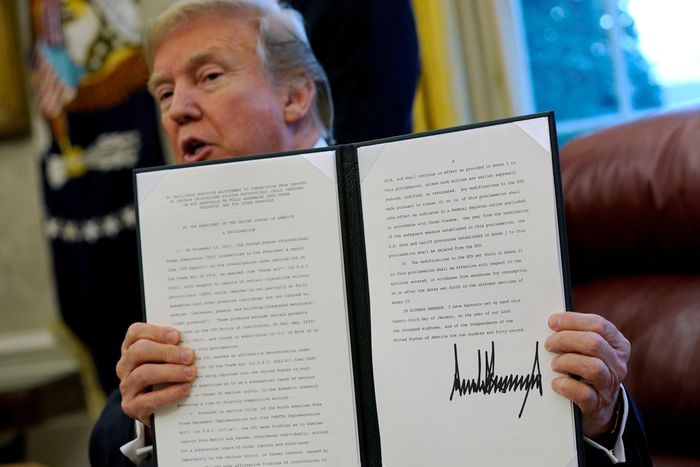WASHINGTON—The Biden administration said Friday it would extend a set of tariffs on solar-energy imports for four years, but significantly reduce their scope by doubling the amount of solar cells that can enter the U.S. without facing any levies.
The tariffs apply to imports of solar cells and modules globally. About two-thirds of the familiar solar modules that go on rooftops and utility installations are made in China, and about 15% are manufactured by countries in Southeast Asia, often at Chinese-owned companies, according to the data from IHS Markit. U.S. producers make about 2%.
The decision is a victory for solar installers who had sought to have the tariffs removed or narrowed in scope to help lower the price of solar energy compared with alternatives. But it is a blow to domestic solar manufacturers who said the tariffs were necessary to create a level playing field against the Chinese competitors who dominate the solar-energy industry’s supply chain.
The Biden administration has been under intense pressure over the decision, which has created a dilemma between the president’s climate agenda of accelerating a transition to green energy and his supply-chain goals of boosting American manufacturers in critical industries.
Relying entirely on tariff-free goods from China is viewed by many as the cheapest option to achieve the administration’s environmental objectives of expediting a switch to green energy, but the low-cost option undercuts American-based solar manufacturing, which has become a minuscule part of the supply chain for solar energy.
“Gutting the safeguard this way makes it almost impossible to believe that we will ever produce solar cells, solar wafers, or polysilicon for solar production in this country ever again,” said Mamun Rashid, the president of San Jose, Calif.-based Auxin Solar Inc., one of the companies that had sought an extension of the tariffs. “This decision undermines our energy independence and our national security.”
The Solar Energy Industries Association, which represents companies that install and use solar panels, welcomed the administration’s actions even though it said it would have preferred to have the tariffs lifted entirely.
“Administration officials arrived at a balanced solution,” Abigail Ross Hopper, SEIA’s president, said Friday following the administration’s decision.
The solar tariffs were first imposed by former President Donald Trump in January of 2018 and were due to expire Sunday.
In taking the action, the Biden administration is ignoring certain aspects of a recommendation made by the International Trade Commission, a U.S. government body that advises Congress and the White House on tariff policy.
In December, the ITC had recommended maintaining both the tariffs and the existing quota level of 2.5 gigawatts of solar cells. The Biden administration instead doubled the quota level to 5 gigawatts, allowing a significant chunk of imports to avoid the levies.

The solar tariffs were first imposed by former President Donald Trump in 2018.
Photo: jonathan ernst/Reuters
China has established its dominance of the solar industry’s supply chain in recent decades, with some steps in the process of creating a solar panel taking place almost entirely in Chinese factories.
China produces 96% of the world’s supply of solar wafers, according to data from IHS Markit. Those wafers are processed into solar cells, where China controls 79% of the market.
Manufacturers in Southeast Asia, many of which are Chinese-owned, supply the U.S. market and make about 12% of global supply. Since China dominates the production of solar wafers, these Southeast Asian cells are primarily built with Chinese inputs.
Currently, no U.S. factory makes the solar cells which are then the key input to most solar panels.
But some of the remaining American solar companies like Auxin Solar and Suniva Inc., which owns a solar-cell factory in Norcross, Ga., had said they would try to bring back U.S. solar-cell production if they had protection from Chinese imports.
Biden administration officials say the U.S. would continue to allow bifacial solar panels—those that collect solar energy from both sides of the panel—to enter the U.S. without paying duties.
Domestic producers have argued that the exclusion for bifacial panels guts the tariffs.
Mark Widmar, the chief executive of Tempe, Ariz.-based First Solar Inc., said his company was deeply disappointed in the Biden administration’s decision.
“Allowing Chinese solar manufacturers to have unrestricted access to the U.S. solar market is not a bet on American workers or ingenuity and innovation,” said Mr. Widmar.
The ITC has said that the bifacial exclusion was an impediment to the U.S. industry.
The Biden administration said it would take some further steps to support the domestic industry.
The Office of the U.S. Trade Representative will work to negotiate an agreement with Canada and Mexico that could exclude them from the tariffs, according to a senior administration official. The administration is also trying to boost the domestic solar-energy industry via “Buy American” procurement rules for the government’s energy needs.
The administration is also attempting to revive its Build Back Better bill, which contains tax credits to manufacturers across the solar-supply chain, and which is supported by both the domestic solar manufacturers and the installers.
Unusual coalitions of lawmakers had lobbied the administration over its decision and the issue divided the Senate along nonpartisan lines.
One group of lawmakers including Sens. Jacky Rosen (D., Nev.) and Brian Schatz (D., Hawaii), as well as Sens. Thom Tillis (R., N.C.) and Jerry Moran (R., Kan.) urged Mr. Biden to drop the tariffs, writing that “domestic prices for solar panels are now among the highest in the world and significantly above the global average, which has severely and negatively impacted clean energy job creation in the United States.”
Another group, including Sens. Rob Portman (R., Ohio) and Marco Rubio (R., Fla.), as well as Sens. Sherrod Brown (D., Ohio) and Bob Casey (D., Penn.) urged Mr. Biden to keep the tariffs in full.
“American solar manufacturing should be a key part of the clean-energy economy,” they said. “China’s exploitative industrial and trade practices continue to hinder the growth of a strong U.S. solar supply chain.”
Write to Josh Zumbrun at [email protected] and Alex Leary at [email protected]
Copyright ©2022 Dow Jones & Company, Inc. All Rights Reserved. 87990cbe856818d5eddac44c7b1cdeb8








